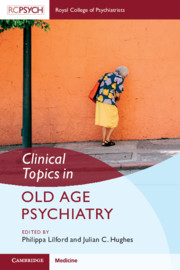Book contents
- Clinical Topics in Old Age Psychiatry
- ‘Clinical Topics In … ’
- Clinical Topics in Old Age Psychiatry
- Copyright page
- Dedication
- Contents
- Contributors
- Preface
- Acknowledgement
- Editors’ Note
- Abbreviations
- Introductory Comments
- Section 1 Epidemiology and Types of Disorders
- Section 2 Assessment and Investigations
- Section 3 Approaches to Management
- Section 4 Law, Ethics, and Philosophy
- Chapter 21 Mental Health Laws from All UK Jurisdictions
- Chapter 22 Deprivation of Liberty
- Chapter 23 Residence Capacity
- Chapter 24 Understanding the Person with Dementia
- Concluding Reflections
- Index
- References
Chapter 23 - Residence Capacity
Its Nature and Assessment
from Section 4 - Law, Ethics, and Philosophy
Published online by Cambridge University Press: 12 September 2020
- Clinical Topics in Old Age Psychiatry
- ‘Clinical Topics In … ’
- Clinical Topics in Old Age Psychiatry
- Copyright page
- Dedication
- Contents
- Contributors
- Preface
- Acknowledgement
- Editors’ Note
- Abbreviations
- Introductory Comments
- Section 1 Epidemiology and Types of Disorders
- Section 2 Assessment and Investigations
- Section 3 Approaches to Management
- Section 4 Law, Ethics, and Philosophy
- Chapter 21 Mental Health Laws from All UK Jurisdictions
- Chapter 22 Deprivation of Liberty
- Chapter 23 Residence Capacity
- Chapter 24 Understanding the Person with Dementia
- Concluding Reflections
- Index
- References
Summary
Residence capacity can be defined as the capacity someone requires to decide where to live. Its assessment is important in a variety of mental disorders. In this chapter we shall mainly focus on dementia, but the nature and requirements for assessment would largely be similar across all conditions. We shall also focus on the relevant law as it pertains to England and Wales, that is, the Mental Capacity Act (MCA), although, again, the nature of residence capacity and the principles for its assessment remain similar across jurisdictions.
- Type
- Chapter
- Information
- Clinical Topics in Old Age Psychiatry , pp. 305 - 316Publisher: Cambridge University PressPrint publication year: 2020

